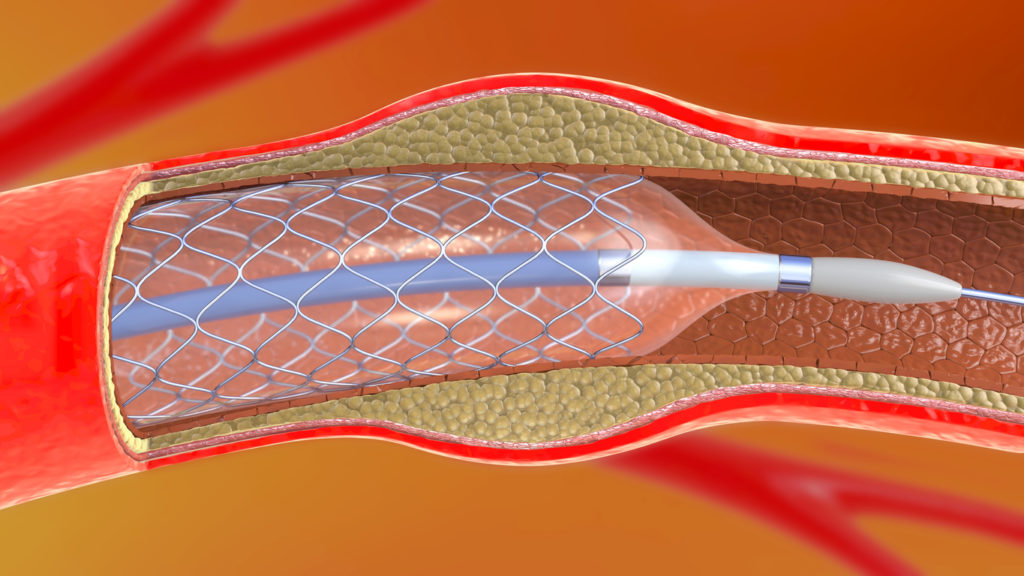Catheters — Medical Community Urged To ‘Immediately Stop Using Affected Devices’

Stent implantation for supporting blood circulation into blood vessels
Problem With Abbott’s Trek and Traveler Catheters Prompts Class 1 Recall
A Class 1 recall has been issued by the U.S. Food and Drug Administration (FDA) for a pair of balloon catheters made by Abbott.
The catheters – the NC Trek RX Coronary Dilatation Catheter and the NC Traveler Coronary Dilatation Catheter – have balloons that might not deflate, possibly resulting in death or serious patient injuries.
“The FDA has identified this as a Class I recall, the most serious type of recall,” the agency stated in the recall notice. “Use of these devices may cause serious injuries or death.”
They expand clogged vessels in the heart and improve the flow of blood, keeping patients alive. However, a problem with removing the sheath that covers the balloon could leave doctors unable to properly inflate and/or deflate the device as required. .
“This issue is due to weaker material close to the balloon bond resulting from excessive exposure to heat during manufacturing,” according to the notice. “Use of these devices may cause serious adverse health consequences, such as prolonged cardiac ischemia (reduced blow flow to the heart), air embolism, thrombosis (clot in the artery), myocardial infarction (heart attack), and additional surgery that could lead to post-operative complications, including death.”
One patient death already has been confirmed, and 13 adverse events have been reported. The recall involves Trek and Traveler catheters with diameters of 4, 4½ and 5 millimeters. The recall does not involve Trek and Traveler catheters successfully used in completed patient surgeries. The catheter manufacturer sent out a field safety notice (FSN) on Jan. 29, 2020, to healthcare professionals who purchased its equipment. Three weeks later, the FDA posted the recall. More than 40,000 Trek and Traveler catheters are affected by this safety recall.
“The frequency of reported events that include slow, partial and failure to deflate the balloon is 0.12 percent worldwide,” Diagnostic and Interventional Cardiology reports in an article titled “Abbott Recalls Two Coronary Balloon Catheters That May Not Deflate.” “At the time the manufacturer’s safety notice was issued, there were no reports of patient death. Since the issuance of the field safety notice, Abbott has become aware of one reported case in which the inability to deflate the balloon necessitated intervention, which resulted in post-procedural complications leading to a patient death.” Unfortunately, many adverse events involving defective medical devices are never reported to the Food & Drug Administration.
Healthcare professionals – and patients – should be diligent in heeding the recall as the FDA does not issue Class 1s lightly. They should “immediately stop using affected devices,” “return all unused affected product” and “share the notification with other relevant personnel,” Abbott said in the FSN. The manufacturer has since indicated publicly that it has stopped shipping the affected lots of the recalled catheters and had taken efforts to avoid similar safety issues with its product in the future.
Recalls of Other Balloon Catheters Issued Far and Wide
Abbott faced a similar Class 1 recall in 2017 involving over 130,000 catheters. Many manufacturers of catheters across the country have had to remove their products from the market because of dangerous flaws.
“In February 2016, Arrow International, a division of Teleflex Inc., recalled 47,140 of its Intra-Aortic Balloon Catheter Kit and Percutaneous Insertion Kits because the sheath body could separate from the hub during insertion,” Qmed contributor Nancy Crotti wrote in an article titled “Abbott Issues a Massive Catheter Recall.” “The problem could cause significant bleeding and interrupt the balloon’s ability to increase blood flow during surgery. Reportedly, one patient died and six others suffered serious injuries.
Between 2015 and 2016, Cook Medical recalled more than 400,000 angiographic catheters, due to tip-splitting,” Crotti continued. “Other manufacturers’ catheters have been subject to several previous recalls due to the potential for materials breaking off the devices and entering a patient’s bloodstream.” FDA cited a similar danger in a September recall of nearly 16,000 defective catheters made by Vascular Solutions of Maple Grove, MN. “Nearly 6,000 of the recalled Twin-Pass catheters were distributed in the United States between October 2014 and September 2016.”
A Class 1 Recall Is the Most Serious Type the FDA Issues
The FDA classifies its recalls under the severity of adverse events. In other words, how hazardous is the product being recalled? Class 1 is the most severe because it creates “a situation in which there is a reasonable probability that the use of, or exposure to, a violative product will cause serious adverse health consequences or death,” according to the FDA’s Web site.
A Class II recall creates “a situation in which use of, or exposure to, a violative product may cause temporary or medically reversible adverse health consequences or where the probability of serious adverse health consequences is remote.”
Finally, a Class III recall creates “a situation in which use of, or exposure to, a violative product is not likely to cause adverse health consequences.”
Share This


